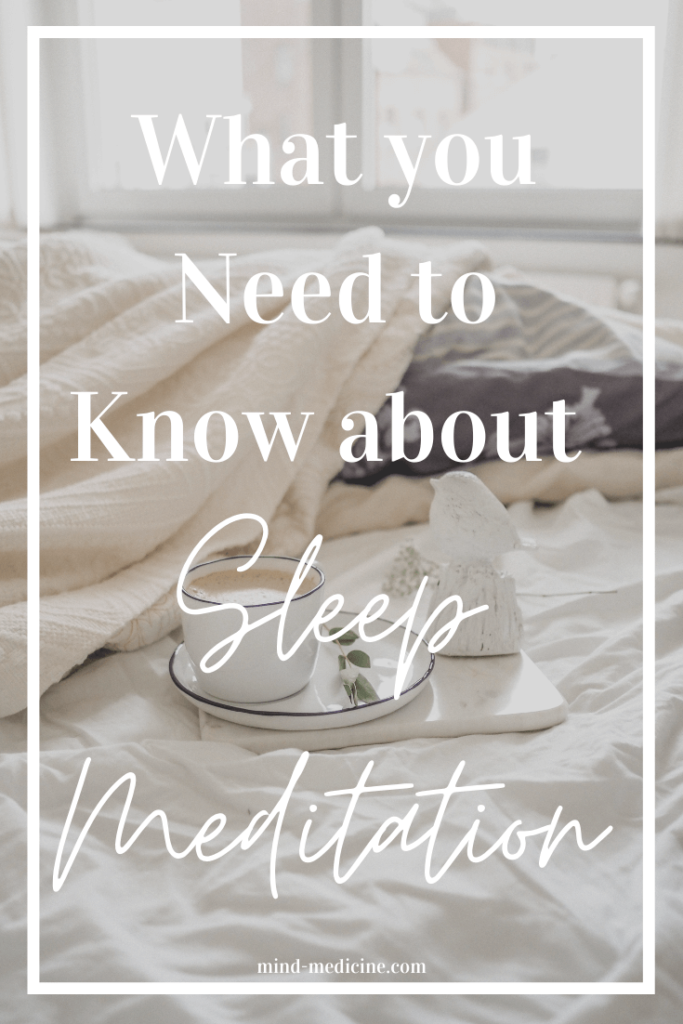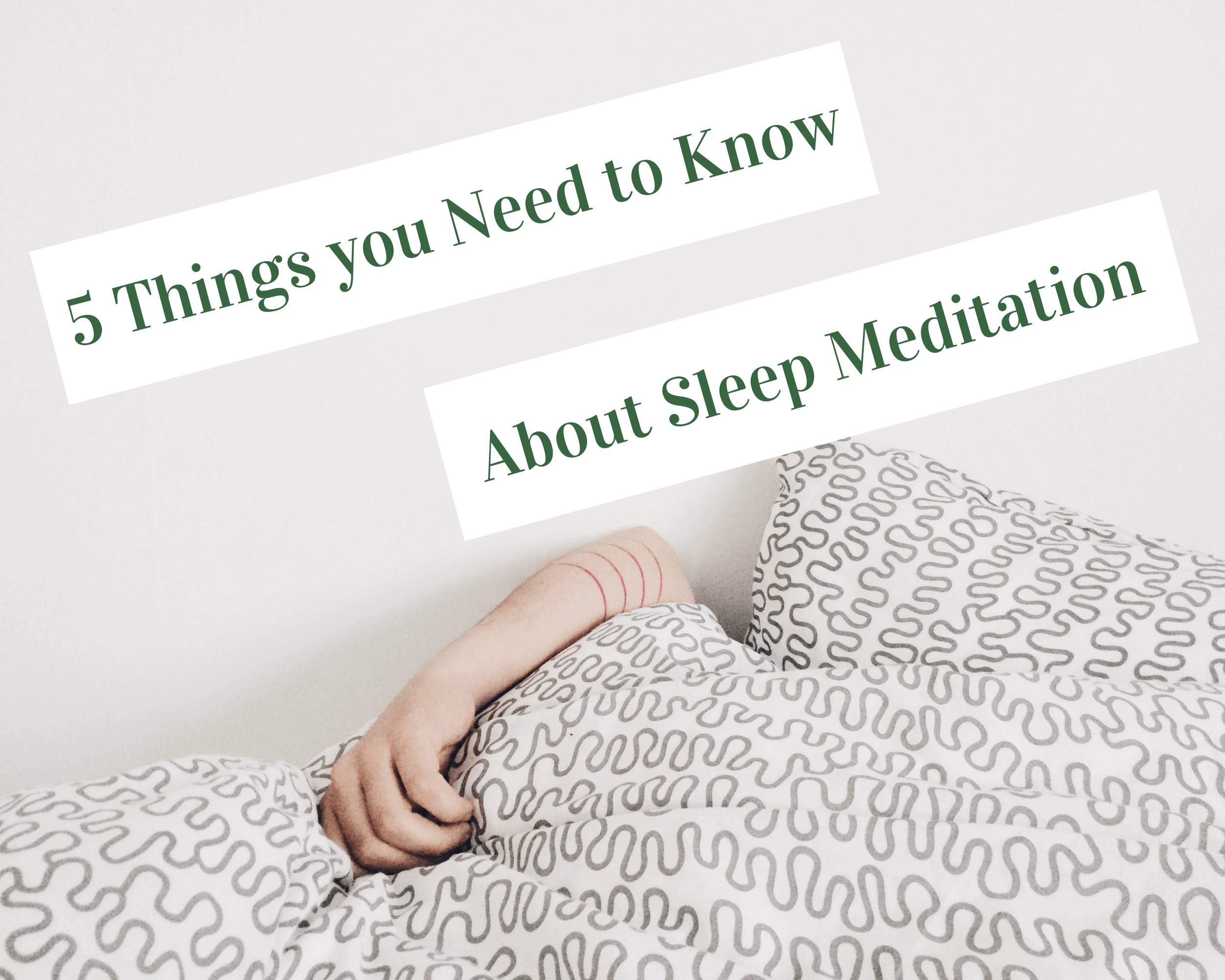Is trying to find a way to improve your sleep keeping you up at night? Sick of feeling tired, stressed and sapped of all energy? You might want to try meditation for sleep to improve this and here are 5 things you need to know before you start mediation for sleep!
Disclaimer: This post contains affiliate links that I earn a commission from at no cost to you
Sleep has come into focus in the wellness sphere. Gone are the days where you would brag about how well you functioned on so little sleep.
We’ve all been there…we know it’s a real struggle sometimes.
How does poor sleep impact your health?
Suffering from chronic lack of sleep can have such detrimental effects on your day to day life.
Did you know that poor sleep can reduce the natural killer cells in your immune system by up to 70%?! Resulting in you being more susceptible to illnesses as your body cannot fight them off. Increasing the risk of other chronic conditions such as diabetes and heart disease.
Poor sleep can also contribute to obesity and a huge imbalance in hormones. These hormones control your appetite, growth and repair, and the release of insulin. Leading to your body not functioning at its best and your health deterioriating.
Sleep deprivation also impacts your mental health and emotional state. While you sleep, your brain gets to work on neuronal pathways to store memories. Without sleep, your mind is exhausted and cannot effectively store and create the nueral pathways it needs.
This can lead to mood swings, irritability and completely lack of focus. Impacting your work, relationships and limiting what you do every day to improve your wellness.
Sleep plays a huge part in your health. Meditation for sleep could help reverse the negative impacts of poor sleep on your wellbeing.

What is Sleep Meditation?
It might be obvious in the name… meditation for sleep.
Meditation is an ancient practice of bringing yourself to the present moment. Training the brain to be less focused and caught up in thought and bringing awareness to the self again.
Commonly used in a morning routine, meditation helps create awareness and alertness for the day.
However, quite often our minds are most active at night. Mulling over the events of the day, what could happen tomorrow and all the ways this makes you feel.
This can make it extremely difficult to fall asleep. Your body is all tense. Your our mind is racing, and you cannot seem to get comfortable.
This is where meditation for sleep comes in.
Rather than creating the awareness and alertness, you feel in morning meditation. Sleep meditation can help relax the body, quiet the mind and create a restful space that encourages sleep.
Personally, I love meditation for sleep. I am able to get to sleep faster, feel more relaxed and usually, sleep more deeply for longer. This is game changing for many.
5 important things you need to know about meditation for sleep
Before you jump right in with sleep meditation. There are a few things you need to know to get the maximum benefit from the meditations. Enabling you to have the best sleep, ever.
1. Start with Guided Meditations
I would never have been able to start my sleep mediation practice without guided meditations. These are usually short tracks that you can listen to online, through apps or audio downloads.
Guided sleep meditations walk you through the process. From body scans to breathwork, there are many ways to execute a sleep meditation. Therefore, guided meditations give you the ability to try different techniques and get a feel for what works best for you.
I encourage you to try a few different ones at first. Following the instruction, immersing yourself in the meditation and fully relaxing into the process.
My recommendations are to try this app, Smiling Mind, and going through the Sleep program for a few nights. I also love LSW Mind Cards sleep collection. You can purchase the whole collection of guided sleep meditations for just £10 and listen to them as many times as you like!
2. Quality of sleep over duration of sleep
Sleeping longer does not always guarantee you feel any better. Why?
You can sleep for hours but if the quality of your sleep is poor, you are not going to receive all of the benefits.
Deep sleep and REM sleep is usually what determines quality sleep. These are the stages of sleep where your brain waves reach their lowest levels but store memories and process experiences. Healing also occurs through the release of hormones and cellular energy is replenished.
REM sleep is also the stage you are most likely to dream.
These stages go through cycles, usually every 90 minutes. Continuing to cycle throughout the night through light and deep sleep.
You can sleep the recommended 7-9 hours but if only a small percentage of that time is deep and REM sleep, you can still wake up feeling tired. For example, if you are waking up consistently throughout the night, you are disrupting the cycles and reducing the chance of reaching REM sleep altogether.
This is why quality sleep outweighs the duration of your sleep.
Studies have shown that mindfulness and meditation improve the quality of sleep. Reducing symptoms of insomnia, depression and fatigue. Therefore, meditation for sleep can be a powerful tool to help you get more REM and deep sleep. Feeling more rested and obtaining all the benefits of positive sleep.

3. You might need more than meditation for good sleep
All the information I’ve given you already make meditation seem like the magic you need to sleep better. But, it might not be the only intervention that you need.
Quality sleep can be determined a lot of factors, even down to your body temperature. Clearing your mind of the day might not be easy sometimes.
Therefore, you may need to introduce other techniques to encourage you to get the best sleep. Here some ideas:
- Reflective journaling – Doing a brain dump of all your thoughts, feelings and worries can help release stress. Articulating what is going on in your mind into reality, emptying your brain in preparation for sleep.
- Hot bath or shower – Deep sleep occurs as your body temperature lowers and your body relaxes. Having a hot bath or shower can promote your body to naturally reduce its temperature and relax. Enabling sleep to come more easily.
- Keeping to a wellness routine – Getting to sleep at the same time every night and waking up at the same time every morning is important. This routine helps encourages your sleep cycles to adjust to this time period. Resulting in you having the maximum amount of deep sleep and completed sleep cycles.
4. Meditation for sleep takes practice
As with any meditation or mindfulness practice, you are not going to be a master the first time you do it. You might have good nights and bad nights but this completely normal.
Don’t beat yourself up if you find your mind wandering and thinking you aren’t meditating right. It takes a lot of practice to be able to control your thoughts and be successful at meditation.
Sleep meditation is such a small, yet powerful tool, to add to your daily routine. Giving up just means you won’t have the opportunity to benefit and have quality sleep.
I encourage you to keep going and practice. This is why I enjoy guided meditations for sleep to follow the instruction and develop the skill needed for successful meditation.
Set yourself the challenge of sleep meditation
Armed with this new insight and knowledge about what sleep can bring you, try it for yourself.
Start with guided meditations to begin your practice. Challenge yourself to first complete a week, then a month, then 6 months… until it becomes a habit. Transform your sleep into high quality, most restful and energising part of your day.
Over time, you will learn the skill and become better and better at meditation for sleep. If you struggle at any point, add some other techniques to aid the process.
We want to hear about how meditation for sleep has changed your life! Let us know in the comments or send us an email!

1 thought on “4 Important Things You Need to Know about Meditation for Sleep”
Comments are closed.